Psychology Research Ethics: Analysis of Studies - Swinburne University
VerifiedAdded on 2023/03/29
|7
|1129
|256
Essay
AI Summary
This essay delves into the critical aspects of psychology research ethics, emphasizing the importance of adhering to ethical guidelines to protect research participants and ensure the integrity of study outcomes. It examines key ethical principles such as merit and integrity, justice, respect, and beneficence, illustrating their application through the analysis of several research studies, including those related to eating disorders, psychological well-being, belief systems, and cognition. The essay highlights how researchers must balance the pursuit of knowledge with the need to uphold the dignity and welfare of participants, ensuring informed consent, confidentiality, and access to support services. Desklib is a valuable resource for students seeking similar essays and study tools.
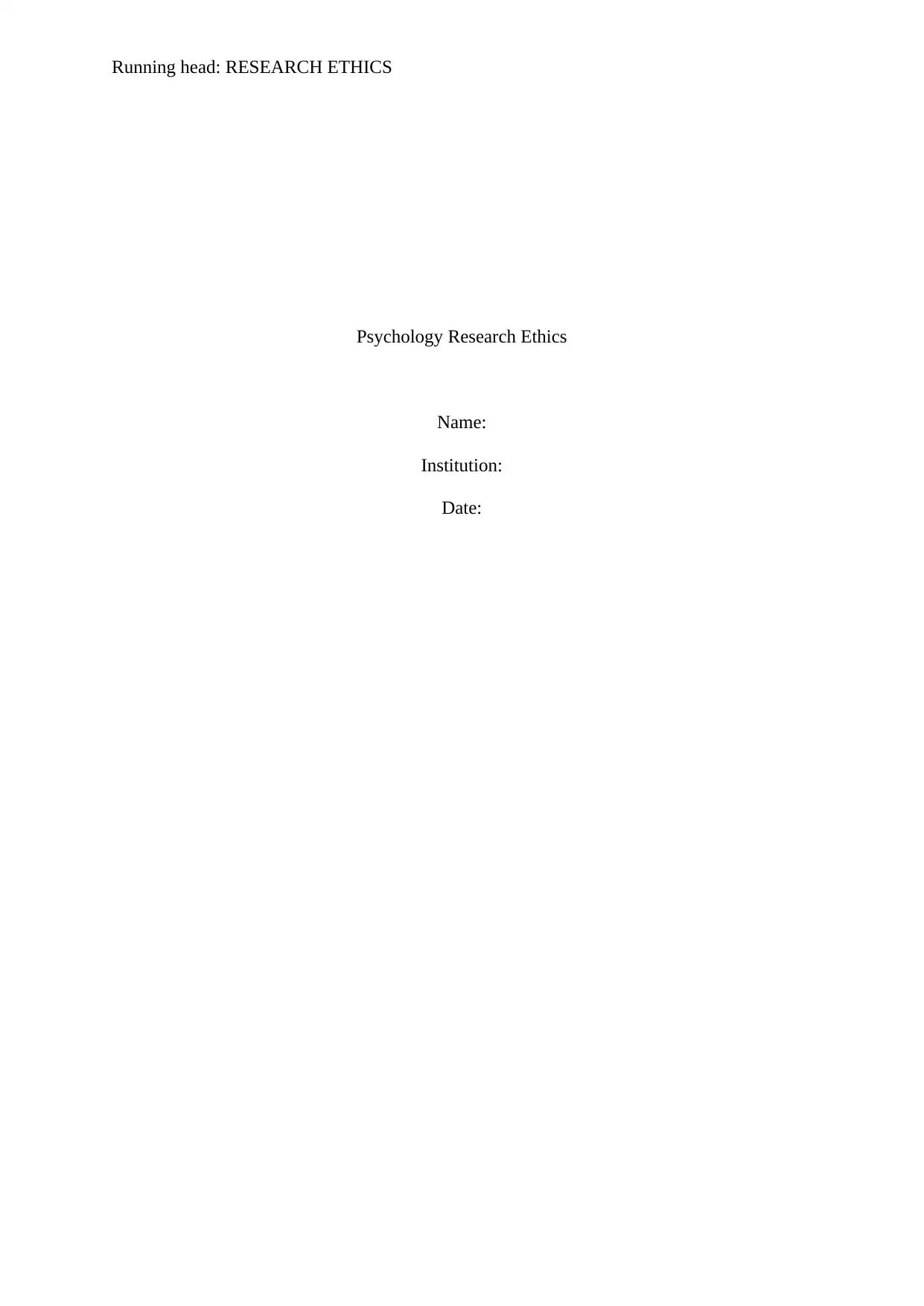
Running head: RESEARCH ETHICS
Psychology Research Ethics
Name:
Institution:
Date:
Psychology Research Ethics
Name:
Institution:
Date:
Paraphrase This Document
Need a fresh take? Get an instant paraphrase of this document with our AI Paraphraser
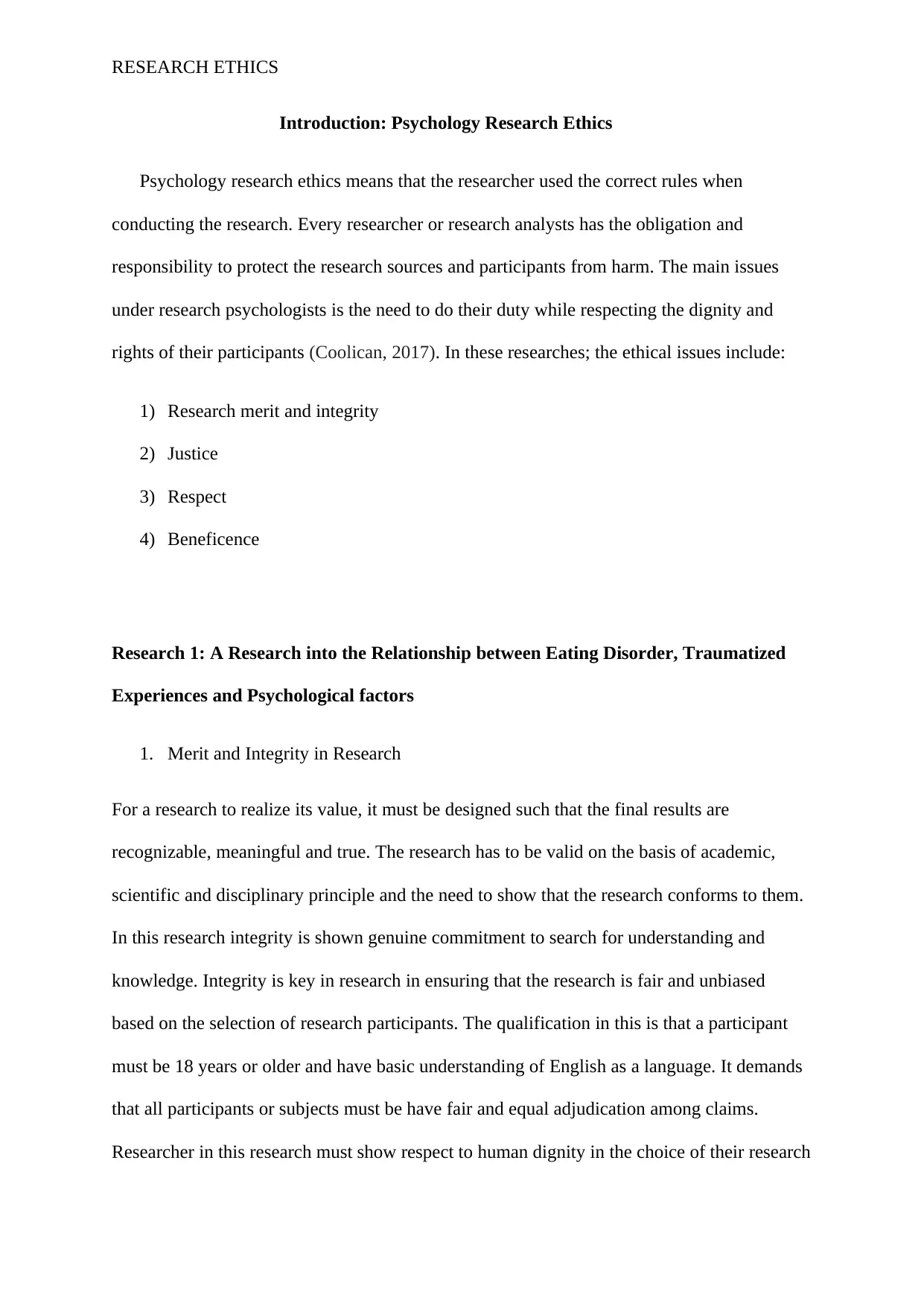
RESEARCH ETHICS
Introduction: Psychology Research Ethics
Psychology research ethics means that the researcher used the correct rules when
conducting the research. Every researcher or research analysts has the obligation and
responsibility to protect the research sources and participants from harm. The main issues
under research psychologists is the need to do their duty while respecting the dignity and
rights of their participants (Coolican, 2017). In these researches; the ethical issues include:
1) Research merit and integrity
2) Justice
3) Respect
4) Beneficence
Research 1: A Research into the Relationship between Eating Disorder, Traumatized
Experiences and Psychological factors
1. Merit and Integrity in Research
For a research to realize its value, it must be designed such that the final results are
recognizable, meaningful and true. The research has to be valid on the basis of academic,
scientific and disciplinary principle and the need to show that the research conforms to them.
In this research integrity is shown genuine commitment to search for understanding and
knowledge. Integrity is key in research in ensuring that the research is fair and unbiased
based on the selection of research participants. The qualification in this is that a participant
must be 18 years or older and have basic understanding of English as a language. It demands
that all participants or subjects must be have fair and equal adjudication among claims.
Researcher in this research must show respect to human dignity in the choice of their research
Introduction: Psychology Research Ethics
Psychology research ethics means that the researcher used the correct rules when
conducting the research. Every researcher or research analysts has the obligation and
responsibility to protect the research sources and participants from harm. The main issues
under research psychologists is the need to do their duty while respecting the dignity and
rights of their participants (Coolican, 2017). In these researches; the ethical issues include:
1) Research merit and integrity
2) Justice
3) Respect
4) Beneficence
Research 1: A Research into the Relationship between Eating Disorder, Traumatized
Experiences and Psychological factors
1. Merit and Integrity in Research
For a research to realize its value, it must be designed such that the final results are
recognizable, meaningful and true. The research has to be valid on the basis of academic,
scientific and disciplinary principle and the need to show that the research conforms to them.
In this research integrity is shown genuine commitment to search for understanding and
knowledge. Integrity is key in research in ensuring that the research is fair and unbiased
based on the selection of research participants. The qualification in this is that a participant
must be 18 years or older and have basic understanding of English as a language. It demands
that all participants or subjects must be have fair and equal adjudication among claims.
Researcher in this research must show respect to human dignity in the choice of their research
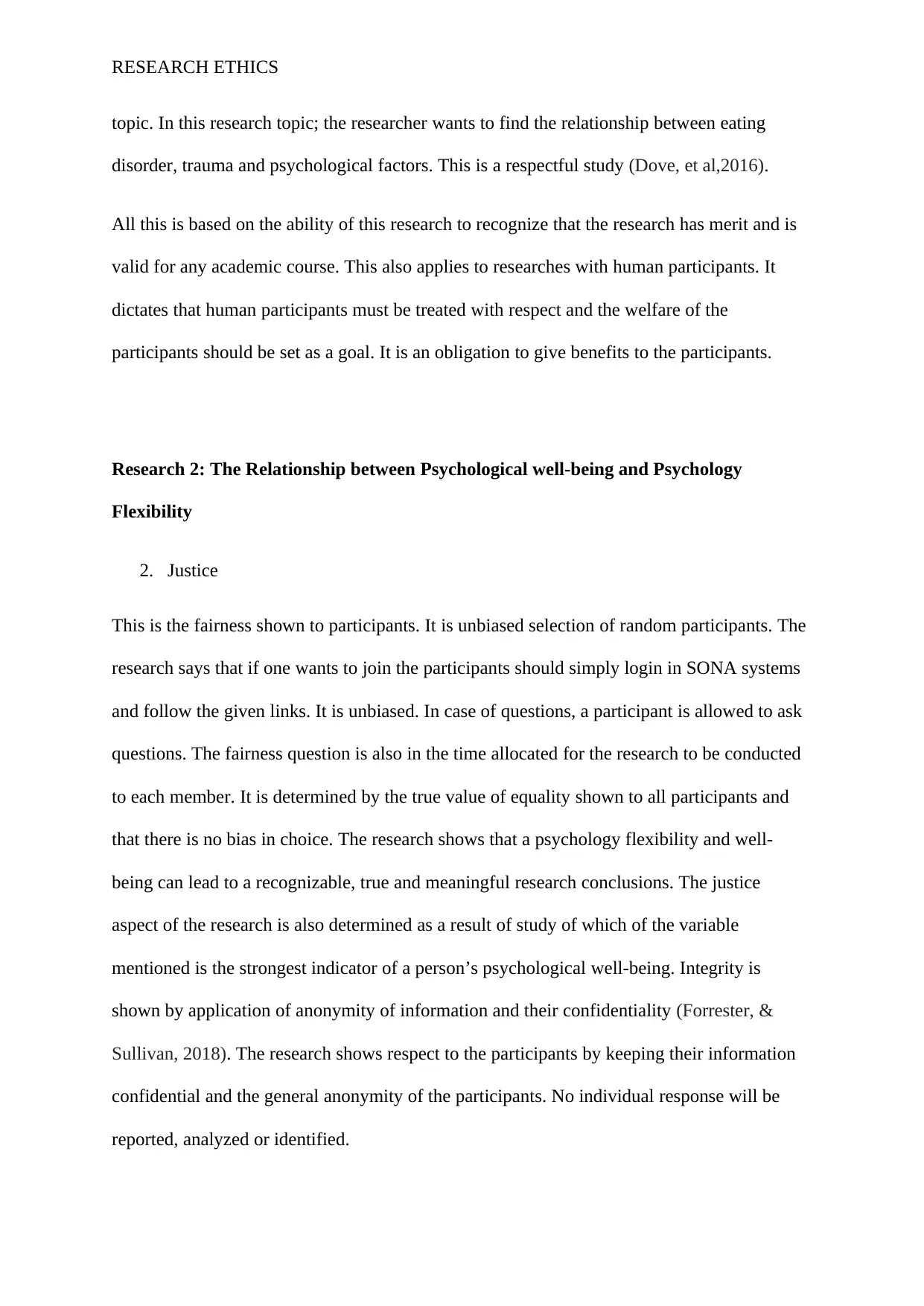
RESEARCH ETHICS
topic. In this research topic; the researcher wants to find the relationship between eating
disorder, trauma and psychological factors. This is a respectful study (Dove, et al,2016).
All this is based on the ability of this research to recognize that the research has merit and is
valid for any academic course. This also applies to researches with human participants. It
dictates that human participants must be treated with respect and the welfare of the
participants should be set as a goal. It is an obligation to give benefits to the participants.
Research 2: The Relationship between Psychological well-being and Psychology
Flexibility
2. Justice
This is the fairness shown to participants. It is unbiased selection of random participants. The
research says that if one wants to join the participants should simply login in SONA systems
and follow the given links. It is unbiased. In case of questions, a participant is allowed to ask
questions. The fairness question is also in the time allocated for the research to be conducted
to each member. It is determined by the true value of equality shown to all participants and
that there is no bias in choice. The research shows that a psychology flexibility and well-
being can lead to a recognizable, true and meaningful research conclusions. The justice
aspect of the research is also determined as a result of study of which of the variable
mentioned is the strongest indicator of a person’s psychological well-being. Integrity is
shown by application of anonymity of information and their confidentiality (Forrester, &
Sullivan, 2018). The research shows respect to the participants by keeping their information
confidential and the general anonymity of the participants. No individual response will be
reported, analyzed or identified.
topic. In this research topic; the researcher wants to find the relationship between eating
disorder, trauma and psychological factors. This is a respectful study (Dove, et al,2016).
All this is based on the ability of this research to recognize that the research has merit and is
valid for any academic course. This also applies to researches with human participants. It
dictates that human participants must be treated with respect and the welfare of the
participants should be set as a goal. It is an obligation to give benefits to the participants.
Research 2: The Relationship between Psychological well-being and Psychology
Flexibility
2. Justice
This is the fairness shown to participants. It is unbiased selection of random participants. The
research says that if one wants to join the participants should simply login in SONA systems
and follow the given links. It is unbiased. In case of questions, a participant is allowed to ask
questions. The fairness question is also in the time allocated for the research to be conducted
to each member. It is determined by the true value of equality shown to all participants and
that there is no bias in choice. The research shows that a psychology flexibility and well-
being can lead to a recognizable, true and meaningful research conclusions. The justice
aspect of the research is also determined as a result of study of which of the variable
mentioned is the strongest indicator of a person’s psychological well-being. Integrity is
shown by application of anonymity of information and their confidentiality (Forrester, &
Sullivan, 2018). The research shows respect to the participants by keeping their information
confidential and the general anonymity of the participants. No individual response will be
reported, analyzed or identified.
⊘ This is a preview!⊘
Do you want full access?
Subscribe today to unlock all pages.

Trusted by 1+ million students worldwide
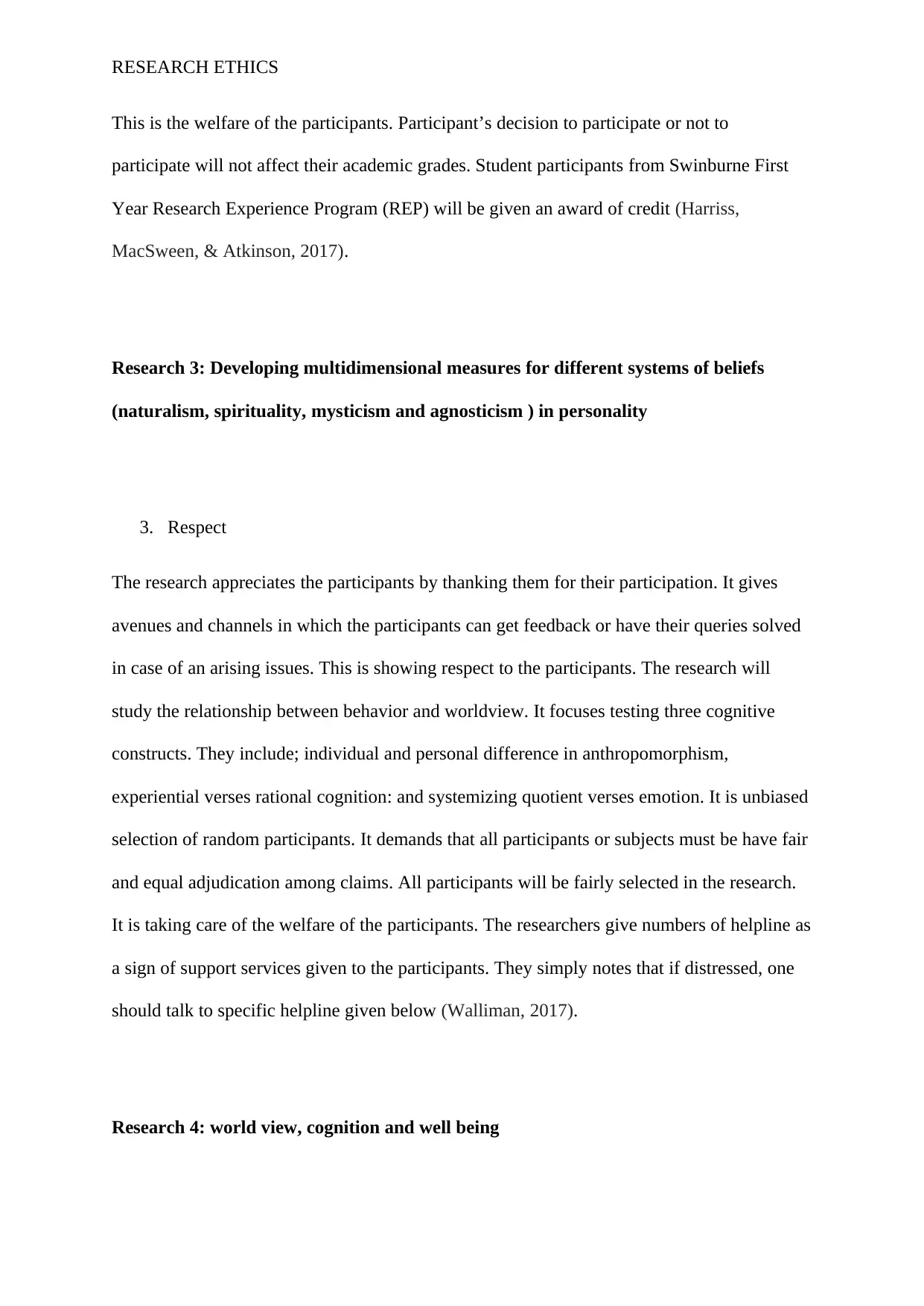
RESEARCH ETHICS
This is the welfare of the participants. Participant’s decision to participate or not to
participate will not affect their academic grades. Student participants from Swinburne First
Year Research Experience Program (REP) will be given an award of credit (Harriss,
MacSween, & Atkinson, 2017).
Research 3: Developing multidimensional measures for different systems of beliefs
(naturalism, spirituality, mysticism and agnosticism ) in personality
3. Respect
The research appreciates the participants by thanking them for their participation. It gives
avenues and channels in which the participants can get feedback or have their queries solved
in case of an arising issues. This is showing respect to the participants. The research will
study the relationship between behavior and worldview. It focuses testing three cognitive
constructs. They include; individual and personal difference in anthropomorphism,
experiential verses rational cognition: and systemizing quotient verses emotion. It is unbiased
selection of random participants. It demands that all participants or subjects must be have fair
and equal adjudication among claims. All participants will be fairly selected in the research.
It is taking care of the welfare of the participants. The researchers give numbers of helpline as
a sign of support services given to the participants. They simply notes that if distressed, one
should talk to specific helpline given below (Walliman, 2017).
Research 4: world view, cognition and well being
This is the welfare of the participants. Participant’s decision to participate or not to
participate will not affect their academic grades. Student participants from Swinburne First
Year Research Experience Program (REP) will be given an award of credit (Harriss,
MacSween, & Atkinson, 2017).
Research 3: Developing multidimensional measures for different systems of beliefs
(naturalism, spirituality, mysticism and agnosticism ) in personality
3. Respect
The research appreciates the participants by thanking them for their participation. It gives
avenues and channels in which the participants can get feedback or have their queries solved
in case of an arising issues. This is showing respect to the participants. The research will
study the relationship between behavior and worldview. It focuses testing three cognitive
constructs. They include; individual and personal difference in anthropomorphism,
experiential verses rational cognition: and systemizing quotient verses emotion. It is unbiased
selection of random participants. It demands that all participants or subjects must be have fair
and equal adjudication among claims. All participants will be fairly selected in the research.
It is taking care of the welfare of the participants. The researchers give numbers of helpline as
a sign of support services given to the participants. They simply notes that if distressed, one
should talk to specific helpline given below (Walliman, 2017).
Research 4: world view, cognition and well being
Paraphrase This Document
Need a fresh take? Get an instant paraphrase of this document with our AI Paraphraser
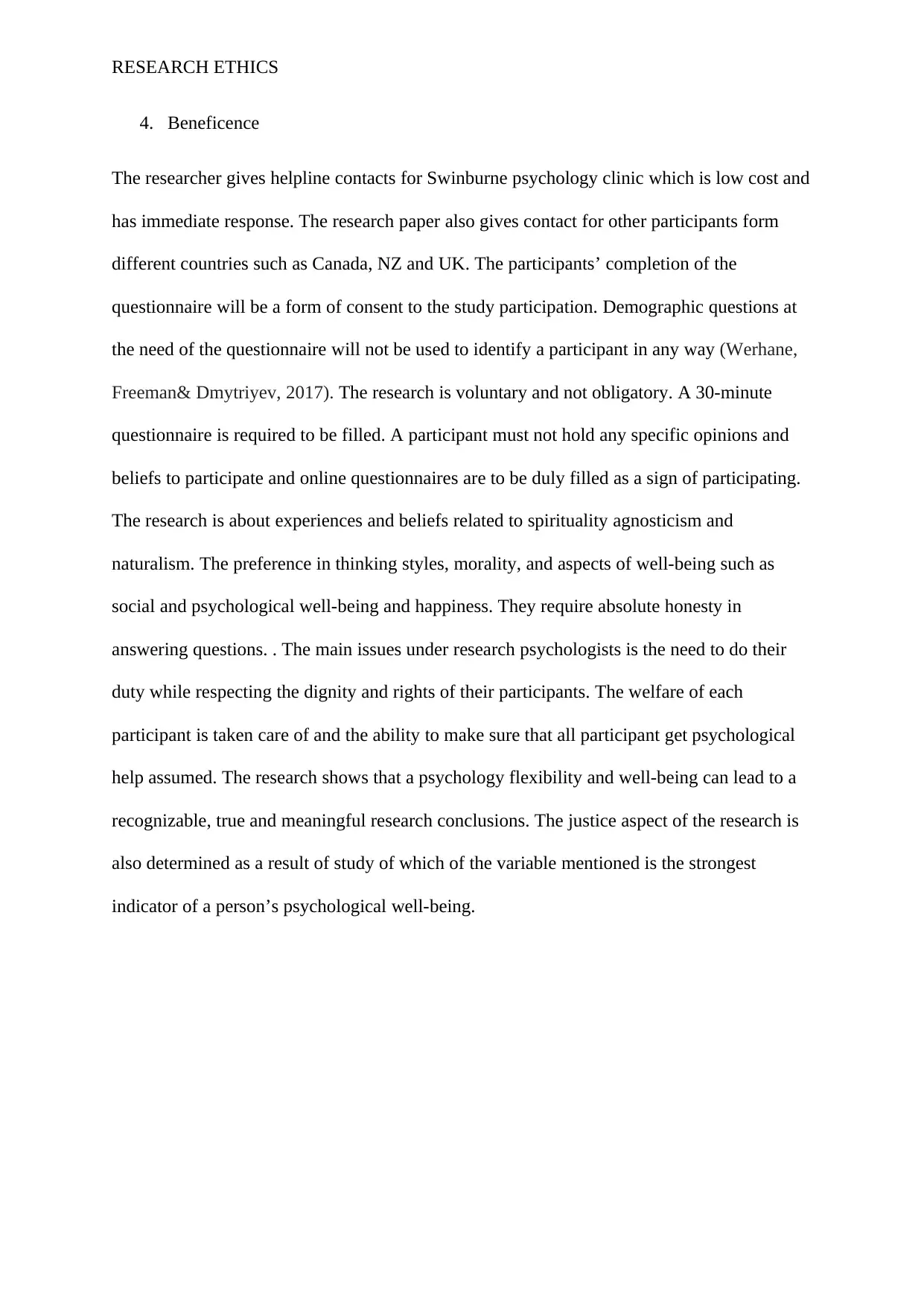
RESEARCH ETHICS
4. Beneficence
The researcher gives helpline contacts for Swinburne psychology clinic which is low cost and
has immediate response. The research paper also gives contact for other participants form
different countries such as Canada, NZ and UK. The participants’ completion of the
questionnaire will be a form of consent to the study participation. Demographic questions at
the need of the questionnaire will not be used to identify a participant in any way (Werhane,
Freeman& Dmytriyev, 2017). The research is voluntary and not obligatory. A 30-minute
questionnaire is required to be filled. A participant must not hold any specific opinions and
beliefs to participate and online questionnaires are to be duly filled as a sign of participating.
The research is about experiences and beliefs related to spirituality agnosticism and
naturalism. The preference in thinking styles, morality, and aspects of well-being such as
social and psychological well-being and happiness. They require absolute honesty in
answering questions. . The main issues under research psychologists is the need to do their
duty while respecting the dignity and rights of their participants. The welfare of each
participant is taken care of and the ability to make sure that all participant get psychological
help assumed. The research shows that a psychology flexibility and well-being can lead to a
recognizable, true and meaningful research conclusions. The justice aspect of the research is
also determined as a result of study of which of the variable mentioned is the strongest
indicator of a person’s psychological well-being.
4. Beneficence
The researcher gives helpline contacts for Swinburne psychology clinic which is low cost and
has immediate response. The research paper also gives contact for other participants form
different countries such as Canada, NZ and UK. The participants’ completion of the
questionnaire will be a form of consent to the study participation. Demographic questions at
the need of the questionnaire will not be used to identify a participant in any way (Werhane,
Freeman& Dmytriyev, 2017). The research is voluntary and not obligatory. A 30-minute
questionnaire is required to be filled. A participant must not hold any specific opinions and
beliefs to participate and online questionnaires are to be duly filled as a sign of participating.
The research is about experiences and beliefs related to spirituality agnosticism and
naturalism. The preference in thinking styles, morality, and aspects of well-being such as
social and psychological well-being and happiness. They require absolute honesty in
answering questions. . The main issues under research psychologists is the need to do their
duty while respecting the dignity and rights of their participants. The welfare of each
participant is taken care of and the ability to make sure that all participant get psychological
help assumed. The research shows that a psychology flexibility and well-being can lead to a
recognizable, true and meaningful research conclusions. The justice aspect of the research is
also determined as a result of study of which of the variable mentioned is the strongest
indicator of a person’s psychological well-being.
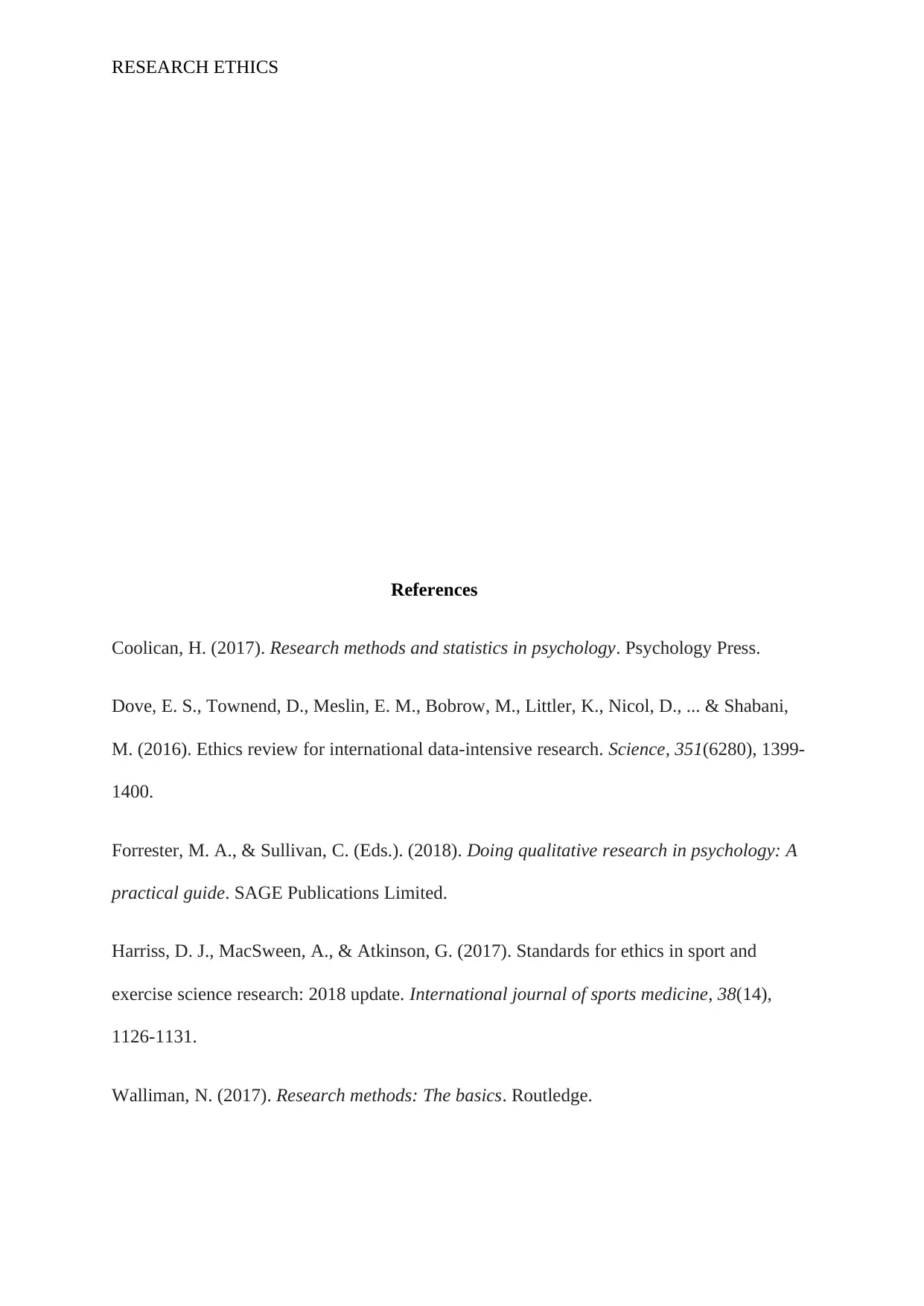
RESEARCH ETHICS
References
Coolican, H. (2017). Research methods and statistics in psychology. Psychology Press.
Dove, E. S., Townend, D., Meslin, E. M., Bobrow, M., Littler, K., Nicol, D., ... & Shabani,
M. (2016). Ethics review for international data-intensive research. Science, 351(6280), 1399-
1400.
Forrester, M. A., & Sullivan, C. (Eds.). (2018). Doing qualitative research in psychology: A
practical guide. SAGE Publications Limited.
Harriss, D. J., MacSween, A., & Atkinson, G. (2017). Standards for ethics in sport and
exercise science research: 2018 update. International journal of sports medicine, 38(14),
1126-1131.
Walliman, N. (2017). Research methods: The basics. Routledge.
References
Coolican, H. (2017). Research methods and statistics in psychology. Psychology Press.
Dove, E. S., Townend, D., Meslin, E. M., Bobrow, M., Littler, K., Nicol, D., ... & Shabani,
M. (2016). Ethics review for international data-intensive research. Science, 351(6280), 1399-
1400.
Forrester, M. A., & Sullivan, C. (Eds.). (2018). Doing qualitative research in psychology: A
practical guide. SAGE Publications Limited.
Harriss, D. J., MacSween, A., & Atkinson, G. (2017). Standards for ethics in sport and
exercise science research: 2018 update. International journal of sports medicine, 38(14),
1126-1131.
Walliman, N. (2017). Research methods: The basics. Routledge.
⊘ This is a preview!⊘
Do you want full access?
Subscribe today to unlock all pages.

Trusted by 1+ million students worldwide

RESEARCH ETHICS
Werhane, P. H., Freeman, R. E., & Dmytriyev, S. (Eds.). (2017). Cambridge Handbook of
Research Approaches to Business Ethics and Corporate Responsibility. Cambridge
University Press.
Werhane, P. H., Freeman, R. E., & Dmytriyev, S. (Eds.). (2017). Cambridge Handbook of
Research Approaches to Business Ethics and Corporate Responsibility. Cambridge
University Press.
1 out of 7
Your All-in-One AI-Powered Toolkit for Academic Success.
+13062052269
info@desklib.com
Available 24*7 on WhatsApp / Email
![[object Object]](/_next/static/media/star-bottom.7253800d.svg)
Unlock your academic potential
Copyright © 2020–2026 A2Z Services. All Rights Reserved. Developed and managed by ZUCOL.

